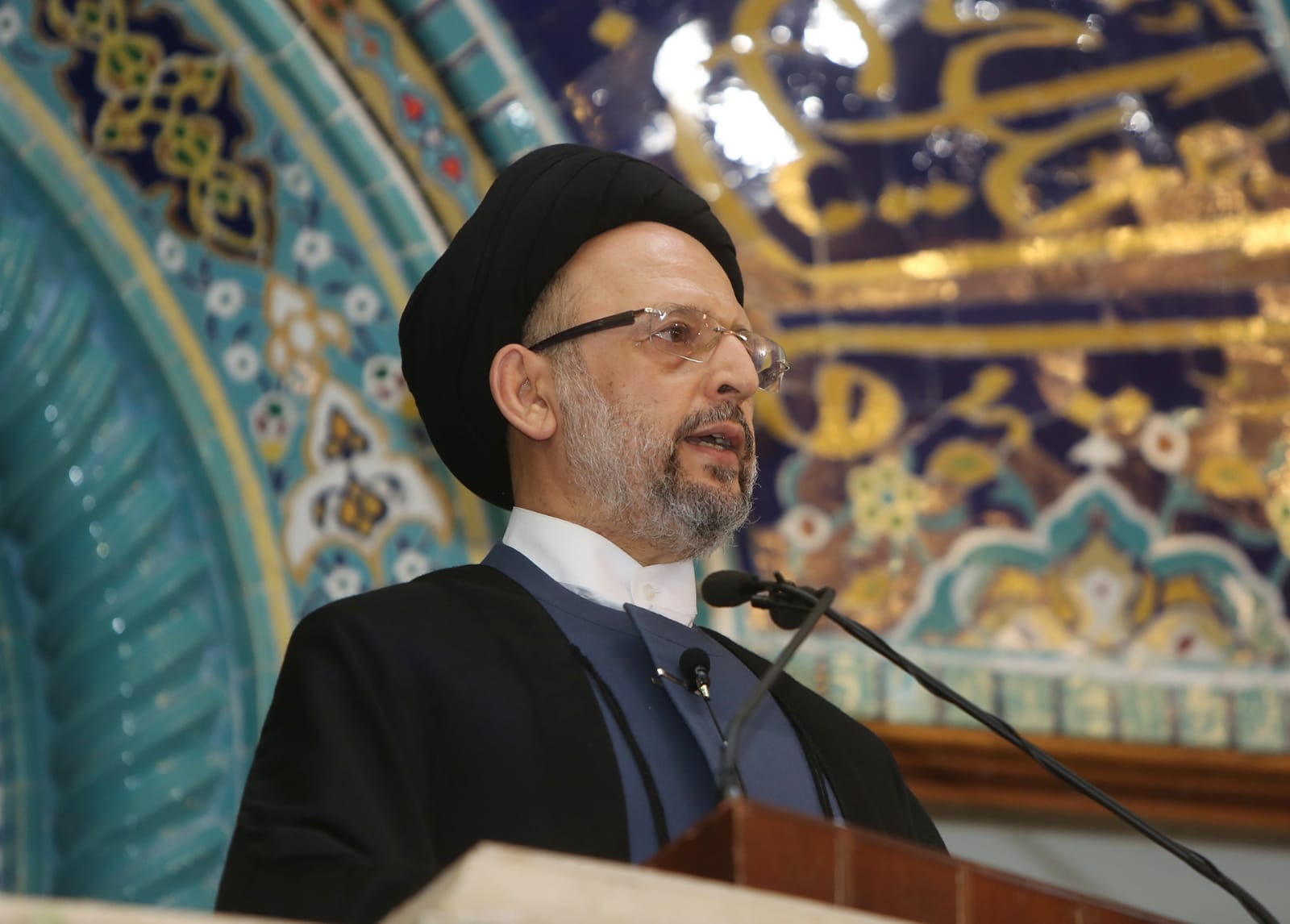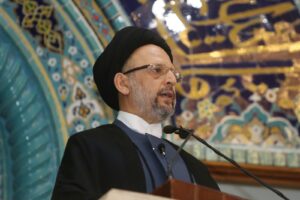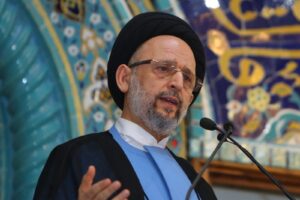In The Name of Allah, The Compassionate, The Merciful.
His Eminence, Sayyed Ali Fadlallah, delivered the two Friday prayer sermons at the Imamain Al-Hassanain Mosque, RAJAB 17, 1446/January 17, 2025. Several prominent religious scholars, dignitaries, and hundreds of believers attended the Jumu’a prayer. Following is a summary of the sermons:
The first Sermon
Allah says in His Glorious Book: {Indeed Allah desires to remove impurity from you, O People of the Household, and to purify you thoroughly}.
On the thirteenth day of this month, the month of Rajab, the blessed birth of the Commander of the Faithful (a.s.) took place. He is one of those whom the will of Allah has been fulfilled to remove impurity from them and purify them thoroughly, and to whom the Messenger of Allah (p.) said: “You are my brother in this world and the hereafter,” “O Ali, you are to me as Haruon was to Musa, except there is no prophet after me.”
Allah, the Most Exalted, wished, in honor of this Imam and to show his status with Him, that his birth took place in the most honored place on earth, in His sacred house. He was blessed by being embraced, raised, and nurtured by the Messenger of Allah, after being taken into his care when he was six years old to ease the burden on his uncle Abu Talib. Ali (a.s.) took from the Messenger of Allah his knowledge, courage, and alloall of hismanners, as he mentioned in one of his sermons: “I followed him as a young camel follows its mother. He would raise for me a standard every day from his morals and knowledge and command me to follow it. “When Gabriel descended upon the Messenger of Allah with the message, Ali(a.s.)
was the first to embrace Islam. He spoke about this when he said: “O Allah, I am the first who turned towards You, heard, and responded.”
When the Messenger(p.) began his mission, Ali(a.s.) was a support, an arm, and a backbone for him. He did not hesitate to respond to the Messenger of Allah when he asked him to sleep in his bed, facilitating his migration from Mecca to Medina so that Quraish would not discover his departure, even though he knew that it might cost him his life. He merely said to the Messenger of Allah: “Will you be safe by my staying there, O Prophet of Allah?” When he (p.) said: “Yes,” he said: “Then go ahead with what you have been ordered.” On that day, the verse descended upon the Messenger of Allah, which set the course of Ali throughout his life: {And among the people is he who sells himself seeking the pleasure of Allah}.
After the migration of the Messenger(p.) to Medina, Ali(a.s.) continued the role he had begun with him. He was at the forefront of all the battles that the Messenger fought, which were imposed on him by Quraish and its allies, and by the Jews who broke their covenant with the Messenger(p.) . Badr, Uhud, The Trench, Khaybar, the conquest of Mecca, Hunayn, and many other battles testified to his heroism.
As Ali was a pioneer in war, he was also a pioneer in knowledge. He conveyed the wisdom of the Messenger of Allah , who said: “I am the city of knowledge and Ali is its gate. Whoever desires knowledge, let him come to the gate.” In this context, Ali(a.s.) said: “The Messenger of Allah taught me a thousand branches of knowledge, each opening a thousand others.”
Before the Messenger(p.) left this world, he entrusted Ali(a.s.) with the responsibility of Islam, charging him with the duty of preserving the message he was commanded to proclaim. Ali(a.s.) was faithful to this trust and preserved it despite the difficulties and obstacles he faced.
On the occasion of his birth anniversary, we take the opportunity to highlight a value expressed by Ali(a.s.) related to his relationship with Allah. He described his servitude to Allah, the Most Exalted, presenting the most sublime model of the human relationship with the Creator when he said: “I did not worship You out of fear of Your Fire, nor out of desire for Your Paradise, but because I found You worthy of worship, so I worshiped You.” This declaration shows that his worship was based not on fear of Hell, despite fearing it, or desire for Paradise, despite striving for it, but on his profound knowledge of Allah…
Ali was present wherever Allah, the Most Exalted, wanted him to be, striving when Allah commanded him to strive, making peace when Allah, the Most Exalted, commanded him to make peace, and being patient when Allah, the Most Exalted, commanded him to be patient. He adhered to justice and faced the traitors, the oppressors, and the renegades for that cause, never compromising on the truth and justice. He would say: “Had I wished, I could have taken the way to pure honey, the kernels of wheat, and the textiles of silk.”
On the occasion of the birth of Ali(a.s.), we are most in need of rising to his level, which calls us to deepen our knowledge of Allah, to realize His greatness, power, majesty, mercy, forgiveness, generosity, love for His servants, and presence in the universe and life. He is the Provider, the Benefactor, the Giver, the Guide, the Forgiving, the Just who does not oppress, the Living who does not die, and the best support and helper in times of distress and hardship, on whom we rely.
Ali(a.s.) understood his relationship with Allah and was sincere in his love, fear, and obedience to Him, making sacrifices for that cause, saying: “The right has left me with no friends.” But where is Ali among those who opposed and fought him? He remains ever-present, mentioned throughout history by scholars, writers, poets, and even those who do not believe in his religion or follow his creed. Khalil ibn Ahmad al-Farahidi, when asked about the Commander of the Faithful (a.s.), said: “What can I say about a man whose virtues were concealed by his enemies out of envy, and hidden by his friends out of fear, yet between these two, his virtues filled the universe.”
The Second Sermon
Servants of Allah, I advise you and myself with what the Commander of the Faithful (a.s.) advised his companions, when he said to them: “Do not speak to me as you would speak to tyrants, do not restrain yourselves from speaking truth to me, and do not act with me with duplicity. Do not think I am above hearing the truth, or that I seek to glorify myself, for whoever refrains from saying the truth or presenting justice to me, the application of them will be heavier on him. Do not stop speaking a rightful word or offering just counsel, for I am not above erring and do not feel safe from mistakes in my actions, except that Allah helps me with what He is more capable of than myself.”
He (a.s.) wanted to teach his companions and us the courage to criticize the ruler and the official, regardless of who the ruler or official is, even if they reach the highest positions. Whether the ruler or official belongs to a religious, social, political, or security faction, we should not flatter them or remain silent about their mistakes out of a desire to get closer to them or out of fear of them. He wanted the ruler and the official to not see themselves above criticism, no matter their position.
If this happens, it will make the nation aware and vigilant over its officials and rulers, reduce their mistakes and lapses, and make them partners in governance and responsibility with those who manage their affairs. This will enable them to face challenges.
Lebanon has recently entered a new phase, starting with the election of a president, followed by the appointment of a prime minister tasked with forming a government. The Lebanese people are hoping for a competent government capable of addressing the severe economic and security crises they are facing. The government is also expected to work seriously on liberating the remaining Lebanese territories occupied by the Zionist enemy and addressing the consequences of the Israeli aggression.
The consensus that led to the election of the president should have also been seen in the appointment of the prime minister. This would have allowed the new administration to fulfill its promises to the Lebanese people. Instead, it led to objections from a significant segment of the population who played a crucial role in the presidential election and in defending the nation, making great sacrifices for it.
Therefore, it is essential to work seriously to remove any concerns, fears, or misunderstandings that arose from this situation. This will pave the way for the formation of the government and prevent any infringement on the national pact and coexistence.
We commend the statements from the president, who expressed his rejection of the exclusion of any sect or component of the country. Similarly, the designated prime minister emphasized unity and national partnership, and the Speaker of Parliament expressed his desire for a solution… These positions give hope for reaching a solution that will end the repercussions of the recent events and ensure that consensus will govern this phase and future ones.
We reiterate that the country cannot be built on dominance, marginalization, or exclusion. The only option for all its components is to communicate, cooperate, and support each other to face all crises in the current and future stages.
It is also important to note that the Shiite sect has played a significant role in building this country through its leaders, scholars, residents, and expatriates. They have made great sacrifices throughout history for this country and continue to do so. The Shiite community has always extended its hand to all Lebanese to build a nation where all citizens are equal in rights and duties. They hope other sects and political powers will reciprocate this goodwill, recognizing that their stance is always in the country’s best interest. If there are any concerns or fears, dialogue is the only way to address them.
We reach the ongoing attacks in the south and the continuous Israeli violations, which we witness daily in the capital Beirut and its suburbs, and in all Lebanese regions. The systematic destruction of buildings in the occupied villages continues, including the ancient olive trees and all forms of life there.
In this context, we want to emphasize to the officials the need to intensify pressure on the committee responsible for the ceasefire to be more serious in working to stabilize it and not wait for sixty days to fulfill its duty, as it seems.
It is regrettable that no voices are raised against the continuous Israeli aggressions, as if what is happening does not affect the country’s sovereignty or the capabilities of its people. The Israeli enemy’s actions harm everyone, not just a particular sect or political power.
Finally, we congratulate the Palestinian people on their achievement in reaching a ceasefire agreement and recovering their prisoners. This allows for the cessation of bloodshed and destruction, even though the enemy continues to maneuver to gain more advantages and portray itself as having the final say.
We believe that this achievement would not have been possible without the legendary resilience of the resistance, and the military, political, and popular support that made great sacrifices in support of Palestine. Most importantly, it was the sacrifices of the Palestinian people and their immense patience despite the genocide and massive destruction of their infrastructure. This made the Zionist enemy unable to achieve its goals through its aggression, namely ending the resistance of this people and displacing them. The enemy’s media has admitted its political failure and the military defeat of its army.




